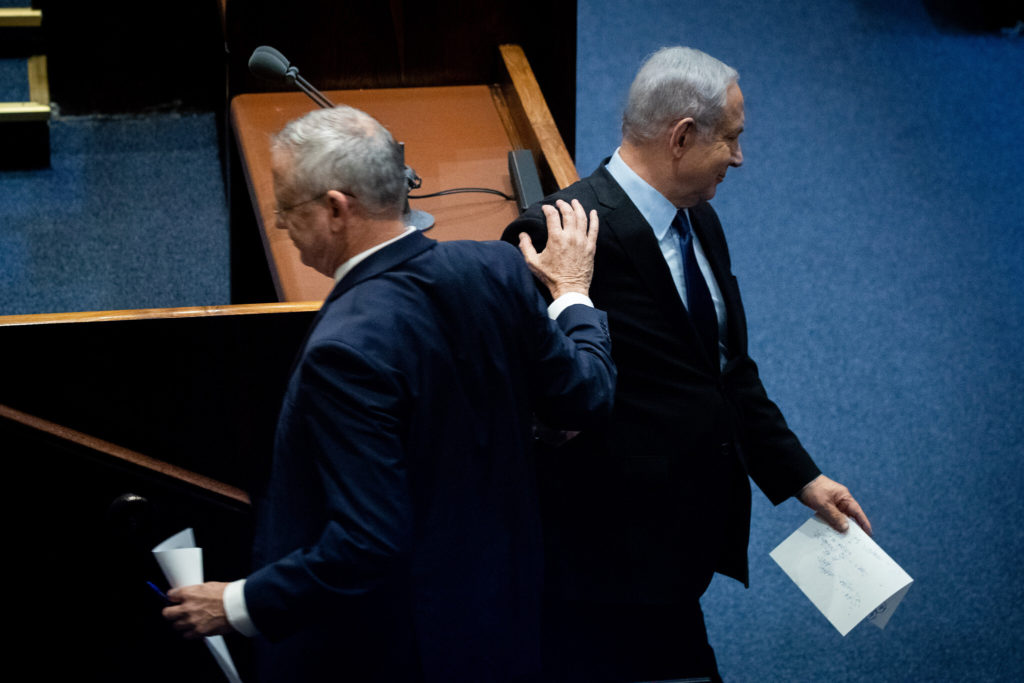Australia/Israel Review
Editorial: At last, a political breakthrough
Apr 29, 2020 | Colin Rubenstein

After three elections, Israel finally has a government. Following weeks of tense negotiations between Israel’s Prime Minister Binyamin Netanyahu and Blue and White’s Benny Gantz, they finally agreed to form a national emergency and unity government to address Israel’s immense challenges – especially the coronavirus crisis and its crushing impact on the economy.
In the first six months, “the government will act as an emergency government” focussed on “dealing with the coronavirus crisis in all its aspects.” It will then transition to a longer-lived national unity government, which will give it time to seriously address Israel’s other strategic challenges, including especially threats from Iran and its proxies in Syria, Lebanon and Gaza.
While Gantz had long promised during the election campaign that he would not sit in government alongside Netanyahu while the latter remains under criminal indictment, the challenges confronting Israel at the current time led him to compromise rather than send Israelis to a fourth election amid a pandemic. As Gantz argued, “these are not normal times and they call for unusual decisions.”
Certainly, the pragmatism and patriotism of both Netanyahu and Gantz demonstrated that the spirit of democratic compromise and service to the national interest is still alive and well in Israel. Israel desperately needs the stable government they seem likely to provide after the unfortunate political impasse the country has experienced over the last year, with no duly-elected government in Israel since December 2018, and no ability to pass a national budget to fund the range of services required – especially crippling amid the current medical crisis.
The 14-page Gantz-Netanyahu deal is unquestionably complex. Netanyahu will serve as PM for the first 18 months while Gantz serves as PM for the subsequent 18 months. While Netanyahu is PM, Gantz will serve as Defence Minister and “Alternate Prime Minister”, a new position to be created by legislation. Netanyahu will be “Alternate Prime Minister” when Gantz becomes PM.
The agreement would also split a record 36 ministers evenly between blocs led by Likud and Blue and White respectively, with both parties being criticised for creating such a bloated and expensive cabinet at a time of national austerity. Yet most Israelis would doubtless agree that, despite this expense, it is best to avoid a fourth election campaign amid the COVID-19 pandemic.
Blue and White and Likud will be joined in government by several smaller parties, making a robust governing coalition of at least 72 members of the Knesset out of 120. The dual structure that Netanyahu and Gantz have created, whereby agreement between the two main blocs is needed for most important decisions, is potentially unwieldy and will need goodwill and political creativity to function effectively.
Controversial Health Minister Yaakov Litzman, head of the ultra-Orthodox United Torah Judaism party, has reportedly asked to be moved from the health to the housing portfolio. Litzman has been criticised by many for his handling of the coronavirus crisis and especially for allegedly pushing to allow ultra-orthodox religious institutions to keep functioning even as health experts were saying they needed to be temporarily shut down – and indeed a concentration of COVID-19 cases in ultra-Orthodox neighbourhoods of Israel has eventuated. Moreover, there are allegations that Litzman broke his own ministry’s guidelines to attend an indoor prayer service.
Litzman’s reappointment would also be a very bitter pill for the Australian Jewish community, including AIJAC, and Australians in general, given that Israeli police have recommended he be indicted because of his alleged interference in the extradition of accused child sex offender Malka Leifer. Leifer is wanted in Australia to face 74 charges of sexual assault from the time she was the principal of the Adass Israel school in Melbourne. The retention of Litzman in health would be a bad look for the new government, while a move to housing may be a somewhat less problematic but still highly unsatisfactory outcome, as Litzman should be sidelined from the ministry until police investigations are completed.
One controversial aspect of the agreement to form the Gantz-Netanyahu emergency government is a clause which allows Netanyahu to introduce legislation after July 1 to apply Israeli sovereignty to areas of the West Bank, as outlined in the US Trump Administration’s peace plan released in January. This is subject to some fairly ambiguous pre-conditions about prior international consultations.
As David Makovksy notes in this edition (p. 16), there are serious diplomatic risks to Israel in doing this. However, as Stephen Daisley points out (p. 18), there is also a case to be made that there is currently a unique and short-lived opportunity to begin implementing the Trump peace plan in a way that will draw reasonably definitive borders between Israel and the ongoing option of a viable future Palestinian state. This is something which simply cannot be achieved through negotiations for the foreseeable future because of the continued Palestinian refusal to even negotiate.
This difficult issue will certainly tax the creativity and cohesiveness of the new unity government.
Gantz has said this is not the kind of government he would have wanted, but desperate times call for desperate measures. The Government he and Netanyahu have forged is certainly unique, and in some ways, unprecedented.
But Gantz and Netanyahu do have a history of working together successfully: when Gantz was IDF Chief of Staff and Netanyahu was PM from 2011 to 2015. And both appear to have few good alternatives to trying to make the current arrangement work. They also bring to the table a broad coalition encompassing most of the centrist members of the Knesset, potentially affording the Government the capability and flexibility to make those important decisions needed to ensure the nation’s health, economic viability and security.
While the challenges are profound, there are good reasons to believe, and every reason to anticipate, that the new unity Government can fulfil many of these expectations.
Tags: Benjamin Netanyahu, Benny Gantz, coronavirus, Israel






